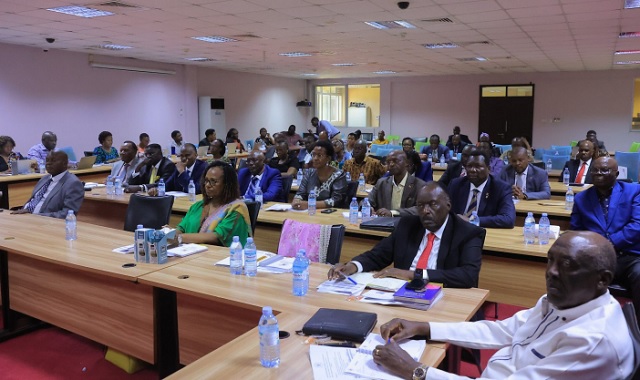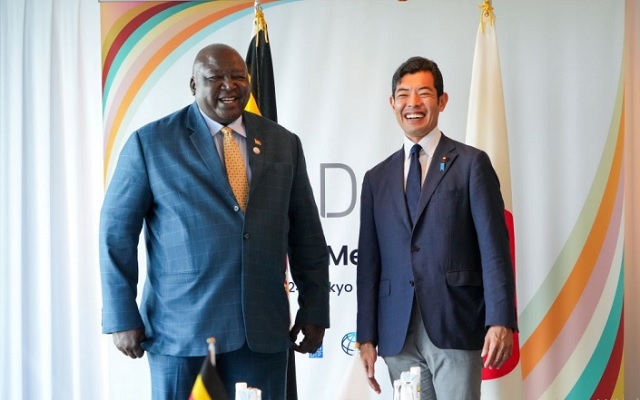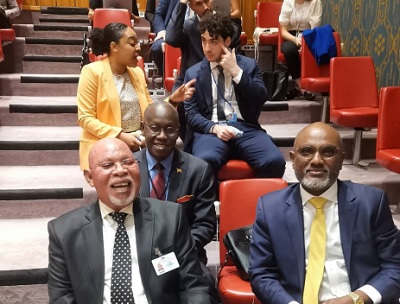
Crisis retreat after expulsions, sanctions and intrigue
COVER STORY | IAN KATUSIIME | For five days, the Ministry of Foreign Affairs (MOFA) and Ugandan ambassadors were in a retreat in Jinja and top on the agenda was the diplomatic crisis Uganda is entangled in following the expulsion of an envoy from Canada; the recalling of another from the United Arab Emirates and a third whose credentials were not accepted by the receiving State, the Democratic Republic of Congo.
The retreat was held at the Civil Service College Uganda in Jinja city from Aug. 26-30 under the theme “Strengthening Governance and Performance of the Foreign Service for National Development.”
The objectives of the conference were; to appraise ambassadors on the government’s priorities and policies, to enhance performance and innovation among missions for improved service delivery and boosting the national image among others. The objectives were right on cue as a good number of Uganda’s representatives abroad would be hard pressed to define Uganda’s policies and priorities.
Secondly, the missions are chronically underfunded with ambassadors routinely reporting of going for months without pay not to mention the dilapidated state of mission premises—the latest case being the Uganda embassy house in Nairobi which was set ablaze during the recent Kenya protests.
The ministry of foreign affairs invited some government top shots to appraise the ambassadors indeed of what is important. These included Ramathan Ggoobi, Permanent Secretary at the Ministry of Finance, Patrick Ayota, MD of National Social Security Fund (NSSF) et al.
Top officials of the Uganda Investment Authority, Private Sector Foundation Uganda were there for sessions on promoting economic diplomacy which emphasized sourcing new markets for Ugandan exports, attracting Foreign Direct Investment (FDI), strengthening economic ties and securing vital resources.
Just before the ambassadors and their bosses at the ministry could catch a breath while at the retreat, news broke of a money laundering scandal at the Ugandan embassy in Nigeria, headed by ambassador Nelson Ocheger with concurrent accreditation to the Republics of Ghana, Sierra Leone, The Gambia and other ECOWAS Member States.
The scandals though of the Ugandan consul general, Henry Mayega, allegedly opening a casino at the consulate in Dubai; and that of the Ugandan ambassador to Canada, Joy Ruth Acheng, in an open confrontation with supporters of the opposition National Unity Platform on the streets of Ottawa, the country’s capital, have been the prism through which Uganda’s diplomatic missions abroad have been observed in the last several weeks.
Mayega and Acheng are both back in Uganda and have been scoured enough for their actions and lack of decorum. The main criticism levelled at the government is that the duo are byproducts of a scheme to appoint political functionaries out of a job, to serve ruling party interests.
Ambassador Joy Ruth Acheng served in the 9th Parliament (2011–2016) as the Kole District Woman Representative before losing in the 2016 election cycle. She belonged to the Uganda People Congress (UPC) party.
Following her loss in 2016, she was appointed as Minister of State for Fisheries but her name was withdrawn at the last minute allegedly following complaints about her from northern Uganda opinion leaders. She was not vetted by the parliamentary appointments committee nor sworn in and, therefore, was never a minister.
She was on the same list as opposition politicians Beti Kamya of the Uganda Federal Alliance (who became minister for Kampala), Betty Amongi of the UPC (who became minister for Lands, Housing and Urban Development), and Florence Nakiwala Kiyingi of the Democratic Party (DP) who became Minister of State for Youth and Children Affairs. They were appointed mainly in Museveni’s attempt to cripple opposition against him in northern Uganda and Buganda.
Mayega, who was posted to China before UAE, was a little known NRM mobiliser before Museveni dispatched him to Beijing. China has underwritten many of Uganda’s highwire infrastructure projects which the president touts as what is necessary for his so called socio-economic transformation agenda.
Mayega is a former Uganda People’s Congress diehard who endeared himself to the ruling party and was rewarded with an ambassadorship in 2015. Many could not fail to link his misstep to his background as someone who should not be holding such a strategic position.
Nelson Ocheger in 2004 registered an opposition party called the Action Party which played a big role in the 2000 referendum on return to multiparty politics. In the June 29, 2000 referendum, Ugandans were to choose whether to maintain the existing Movement system or opt for a multiparty system.
The main opposition parties, the Reform Agenda, UPC, DP, and CP opposed the referendum and argued the public not to participate. But Ocheger formed a group calling itself the Multiparty National Referendum Committee (MRC) which insisted on participating. It later descended into chaos as it was seen as a Trojan horse for Museveni.

Ocheger was later kicked out of its leadership. In 2018 Ocheger became Uganda’s ambassador to Equatorial Guinea. Before that he was the deputy head of mission at Uganda’s embassy in Moscow.
Leader of Opposition Joel Ssenyonyi condemned Acheng and Mayega’s behaviour and rapped the appointing authority for how decisions are made on who becomes ambassador. He called for the nurturing of career diplomats for the sake of the country’s image abroad.
The long running political playbook of President Museveni rewarding disgruntled politicians or supporters of the ruling NRM party with ambassadorial posts has been cited as a major factor in the deteriorating standards in Uganda’s diplomatic practice.
Critics say such appointees descend into embarrassing and unseemly behaviour due to lack of grounding in the rarefied world of diplomacy where nearly every word said or action taken ought to be measured against its outcomes.
Acheng’s dismissal and persona non grata status was greeted with celebration on Ugandan social media as many flayed her for the partisan bickering she indulged in while shouting down NUP supporters who had gone to attend their party convention in the North American country. Ugandans lambasted the high commissioner for subordinating the national interest to settle a score with the opposition.
When Acheng was sent packing, it brought back the debate of how little training and induction Ugandan ambassadors and embassy staff go through. Uganda does not have a diplomatic academy where would be career foreign service staff would get requisite grooming and internalise aspects of their work as enshrined in the 1961 Vienna Convention on Diplomatic Relations.
The Convention is an international treaty that provides a framework for diplomatic relations and currently has 193 state parties. In its 53 Articles, the treaty spells out how diplomats and countries operate to maintain relations while respecting each other’s sovereignty.
A scan of the X account of the former high commissioner, Acheng, shows almost zero adherence to any of the modus operandi spelt out for diplomats as she proudly professed her allegiance to the NRM. This is in spite of her brief to Canada, a large Western country with sizeable influence and a culture of free opposition politics.
According to the website of the Ugandan High Commission in Canada, the mission has a wide scope of coverage so it is supported by honorary consulates in Toronto, Vancouver, and Montreal. This would mean that the High Commissioner has a host of issues and people to attend to since there has been a reported high number of Ugandans emigrating to Canada.

It is not clear to what extent the faux pas by Acheng or the casino-gate scandal by Mayega was addressed at the just ended ambassadors’ retreat.
Vincent Bagiire, the permanent secretary at MOFA, could not be reached for comment on what kind of administrative action might be taken against the two disgraced envoys.
Margaret Kafeero, the spokesperson of MOFA, denied the retreat being any form of avenue to discuss the diplomatic crisis Uganda is mired in. “The ambassadors conference is an annual retreat to engage in substantive aspects of their day to day work and to assess our foreign policy direction,” Kafeero told The Independent.
She added, “It is not a disciplinary committee or an administrative body and as such those issues do not form part of the agenda.” However, some of the ambassadors The Independent spoke to painted a picture of a house on fire.
With the tempest likely to go on with more scandals and more expulsions, commentators say the government should brace itself for more damage control.
Sanctions
MOFA and Ugandan diplomats have also dealt with sanctions headache which has intensified this year. In April and May, the U.K. and U.S. respectively announced travel and financial sanctions on the Speaker of Parliament Anita Among for her entanglement in the theft of iron sheets meant for the people of Karamoja in northern Uganda and other corruption tendencies. Speaker Among said the sanctions were payback for the anti-homosexuality law passed in 2023.

The two countries which have a fanciful special relationship also sanctioned two other culprits in the heist; ministers Goretti Kituttu and Agnes Nandutu who have since lost their jobs.
During a plenary discussion in parliament days after the sanctions, the Speaker put MOFA to task on their silence and why they had not defended the country appearing to conflate her troubles with that of the nation.
In a statement, John Mulimba, the state minister for regional affairs, said Uganda looked forward to engaging with the British High Commission and the UK government. According to sources at MOFA, it was discovered that Among has property in the U.K. registered in her child’s names as part of her ill-gotten wealth. Senior Ugandan army officers are also under U.S. sanctions for their roles in human rights abuses and political persecution of the opposition.
Intrigue
Uganda currently maintains about 42 diplomatic representations worldwide. These include 22 embassies and 20 consulates. Up to 17 of these are in Europe, 9 in Africa, and the rest in the Middle East and Asia.
Several of these ambassadors have been caught up in diplomatic intrigue and it is being telecast in real time.
A tweet by Chief of Defence Forces Gen. Muhoozi Kainerugaba recently gave Ugandans a glimpse of this kind of intrigue some of them are engaged in when he implied that the Minister of Foreign Affairs, Jeje Odongo, has been answerable to Uganda’s ambassador to the UN Adonia Ayebare.
Even before Muhoozi’s assertions, there was a sense that Odongo is overshadowed by another of his subordinates; Okello Oryem, the Minister of State for Foreign Affairs.
Muhoozi, Museveni’s son who has declared his presidential ambitions, has assumed a diplomatic role meeting ambassadors at his residence including some western envoys whose countries have had icy relations with Uganda.
But the real diplomatic intrigue that has unnerved MOFA has been Muhoozi’s posts on a wide range of issues such as the conflict in eastern DRC, Ethiopia, Ukraine and a tweet on invading Kenya that earned him a demotion from his father. In all, the ministry played the safer option—saying the First Son was speaking in his personal capacity—as opposed to rebuking a powerful figure for breach of diplomatic protocol.
 The Independent Uganda: You get the Truth we Pay the Price
The Independent Uganda: You get the Truth we Pay the Price



